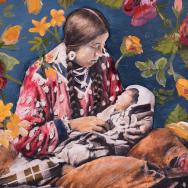Eric Elshtain, PhD’10, is the first ever poet in residence at the Field Museum—“not a position I applied for,” he says, “but just an idea I had.”
The University of Chicago alum wrote his dissertation on the on the use of poetry as a scientific tool for speculation, touching on the work of scholars such as Johann Wolfgang van Goethe and Charles Darwin. Now the author of several poetry chapbooks, Elshtain knew the Field had hosted visual artists in residence before and thought his medium might have a place there too.
So with some help from the Poetry Foundation (“I thought it might help to have some other institutional support, as opposed to walking in and saying, ‘I want to be your poet,’” he explains), he crafted a proposal that the museum quickly and enthusiastically accepted.
Then he got to work: In addition to writing his own poems inspired by the Field’s collection—including “Ode to Máximo,” dedicated to an enormous titanosaur—Elshtain helps museum visitors discover the bard within. Currently, due to the pandemic, he is a remote poet, designing poetry-based exercises included in the museum’s online curricula for schoolchildren.
But in normal times, seated at a mobile desk with a typewriter, he works with children and adults to convey in verse the questions, ideas, and experiences that arise from what they see. Here, Elshtain describes two of his favorite experiences with museumgoers. His comments have been edited and condensed.
“I was sitting in and amongst the mammal dioramas, which I think have become my favorite part of the museum. This guy walks by, looks at me, stops, and says, ‘I just noticed you’re a poet. I need to talk to you.’ He told me he’d been thinking about Martha, the last passenger pigeon, in a zoo in Philadelphia, all alone, the last of her kind.
“As he started talking about Martha, I started typing. That became a draft. Then we sat and worked together. I explained certain decisions I was making about line breaks and so forth. We basically composed a poem based on his verbatim observations about Martha, the last passenger pigeon.
“What would he have done otherwise? He probably would have just walked away, and those thoughts wouldn’t have been put down anywhere.
“Another experience: a woman in her mid-30s was with her grandmother. They had been through an exhibit on wildlife photography. She walked by, read the sign that explains what I do, let out this huge sigh, and said, ‘I need your help. I’m just so distraught. I’ve been put in a dark place by that exhibit, because I keep thinking about environmental destruction and climate change and the disappearance of these creatures, and I need someone to help me express myself.’
“She sat with me for close to an hour and we worked out a poem on her thoughts about extinction and environmental distress and her distress. It was an important moment for her—and for her grandmother, who decided that she might need to start doing some writing as well, because she has some thoughts.
“Some people have been moved to tears because they’ve been given what they consider a gift. I try to tell them: It’s a gift you’re giving to yourself. Because many times, all I’ve done is transcribed their words verbatim and tried to capture the natural rhythms of human speech. That’s really my contribution. I’m like a translator.”
—This story was first published by Tableau, the magazine of the Division of the Humanities.

